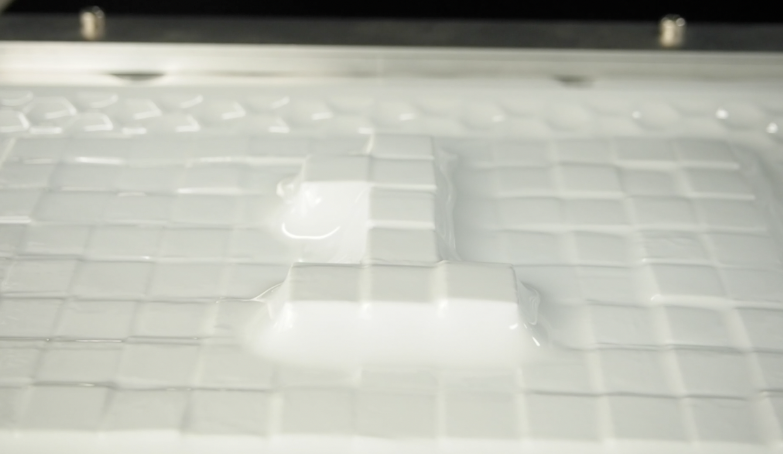ProtoMold
An Interactive Vacuum Forming System for Rapid Prototyping

ProtoMold is a novel fabrication machine which uses interactive vacuum forming system for rapid prototyping. ProtoMold combines a dynamical shape-changing surface that consists of 12 × 8 linear actuators and a vacuum forming system. According to the shape of the surface, this system can mold various 2.5 dimensional objects quickly. Another characteristic of this system is that users can reuse molded objects and change their design; by applying tension and heat to a molded object, the object becomes flat and can be molded again. We also designed user several interaction methods for manipulating ProtoMold. In addition to loading predesigned data, the user can control the shape of the pin display directly using gesture input or physical objects.
We propose several use scenarios for ProtoMold: changing the design of a plate based on objects placed on it, fabricating a facemask with a printed texture, and fabricating electrical devices with printed electronic circuits. By using this system, we conducted a user test and discuss the known limitations and potential applications of our system.
ProtoMoldは、高速かつやり直し可能な2.5Dプリンターです。近年普及している一般的な3Dプリンターなどのデジタルファブリケーションツールは、造形に時間がかかり、材料は使い捨てです。そこで、高速かつやり直し可能な真空成形法(バキュームフォーム)と動的なピンディスプレイを組み合わせたProtoMoldを開発しました。ユーザは、ジェスチャ入力や、3Dスキャナなどを使って、ピンディスプレイを制御し、型を作ります。型の成形後、樹脂の板を熱で柔らかくし、吸引器で吸引することで、一瞬で型に定着させます。完成後、樹脂の板を熱することで平らになり、再び利用することができます。
本装置を用いることで、日々の食材の形に応じたトレーを食事ごとに作り直すことができ、輸送や材料のコストを削減できます。またインクジェットプリンターと組み合わせることで、お面や地形のデザインが簡単にできます。さらに導電性インクを用いることで、回路を含めたプロトタイピングが可能です。例えば、LEDを内蔵した光る造形物や、複数のシートを組み合わせることでヘッドマウントディスプレイの試作など複雑な形状も試作可能です。さらに形だけではなく、印刷した模様や回路もやり直しができます。


dl.acm.org/citation.cfm?id=3025498&CFID=934053129&CFTOKEN=46155125
Junichi Yamaoka and Yasuaki Kakehi. 2017. ProtoMold: An Interactive Vacuum Forming System for Rapid Prototyping. In Proceedings of the 2017 CHI Conference on Human Factors in Computing Systems (CHI ’17). ACM, New York, NY, USA, 2106-2115. DOI: doi.org/10.1145/3025453.3025498
Acknowledgement: JST Kawahara ERATO Universal Information Network Project(万有情報網プロジェクト)